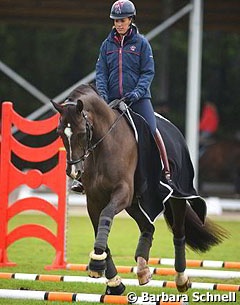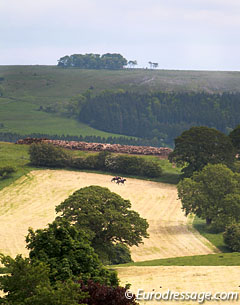
If curiosity killed the cat, then boredom killed the horse; at least in spirit anyway. A horse is a very curious creature and a horse's maturity has often been compared to that of a young child. I don’t always agree with this analogy as I’ve witnessed many incredibly smart horses, and some fairly doppy kids. However one thing is certain, horses, like children, need to be kept entertained.
So, how do we tell if our horse is bored, and how do we keep them curious enough in training to foster their willingness to grow and learn? With some horses it’s very hard to tell if they are bored, whereas with others it is very obvious! Batialo, for example, gets naughty when he is bored and starts to look about for things that might be more entertaining. Other horses might get lazy, or not want to go at all. Others might just pretend the rider isn’t there, and do their own thing.
Every top rider I speak to says that they always mix up their training week, and never have I spoken with a competition rider who says that they work on the flat every single day. An unexperienced rider will often get frustrated with their horse, feeling that he is just not wanting to work, without considering the fact that you might be boring him to death doing the same circles and the same straight lines, day in and day out. Punishing the horse, is not only unfair, it leads to more resentment, and less desire in the horse to please his rider. So mix it up!
“Variation is important for both the physical and mental health of the horse,” says Dr Hilary Clayton BVMS, Ph.D., MRCVS, Equine Biomechanics expert. “In an ideal world we would probably school dressage 4 days per week on alternating days and do something a bit different on the other days. That leaves three of the seven days open to give the horse a mental and physical break, and a chance for us as riders to develop a different skill, or relax a little ourselves."
 "Different," according to Dr Clayton, includes; hacking, jumping, paddock turnout, etc, which can be alternated according to what fits in best on that particular day. Eg, if there are tornado winds, perhaps opt for a little indoor trot pole series, or on a nice sunny day, head out for a relaxing ride.
"Different," according to Dr Clayton, includes; hacking, jumping, paddock turnout, etc, which can be alternated according to what fits in best on that particular day. Eg, if there are tornado winds, perhaps opt for a little indoor trot pole series, or on a nice sunny day, head out for a relaxing ride.
It seems so simple, yet many riders get into a routine and often tell themselves, “oh tomorrow I’ll do that instead,” and then think "oh no I have to work on my walk pirouettes," and the next thing you know it’s four months later and the horse is thinking, “I wonder if that forest is still out there?”
“Another way to change things is to ride on different surfaces, in different places, or to school some of the movements outside of an arena - on trails or in a field.” says Dr Clayton. She agrees that most trainers are unlikely to embrace this kind of schedule for different reasons, but that the importance of diversity is not just limited to illuminating boredom! “The variety helps physiologically by providing the musculoskeletal system with a variety of proprioceptive information that trains the locomotor reflexes to cope with a variety of loading scenarios and also strengthens the tissues in a diverse manner.”
 In other words, a sprinter doesn’t sprint every day. He works in the gym, he does pilates, he strengthens a range of different muscles, in a range of different ways, to gain absolute strength as opposed to strength that is sprint specific.
In other words, a sprinter doesn’t sprint every day. He works in the gym, he does pilates, he strengthens a range of different muscles, in a range of different ways, to gain absolute strength as opposed to strength that is sprint specific.
“Overall the horse is better prepared to cope with uneven footing or taking a bad step,” added Dr Clayton. “And mentally the horse is stimulated by having some variety in the environment which keeps them interested and more alert.”
Dr Clayton notes that all horses respond differently to boredom, but that no matter the response, a little variety might just be the solution. “Some turn into robots, others light up and look for excuses to be naughty and keep themselves amused. Neither response is beneficial for dressage training," she stated.
by Sarah Warne - Photo © Barbara Schnell - Astrid Appels